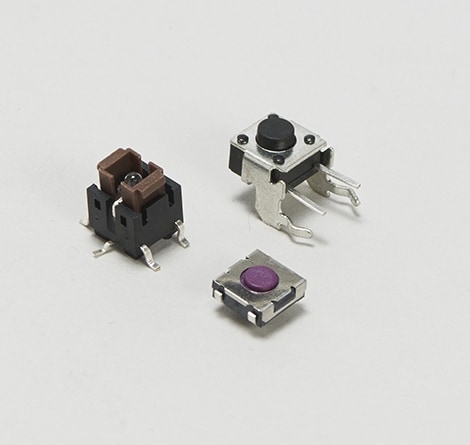Gaming professionals often seek out premium tactile switches for smoother keystrokes.
Comprehending the Perks of Tactile Switches for Enhanced Customer Experience
Tactile buttons are important to modern customer interfaces, providing physical comments that boosts interaction precision and user contentment. By providing a distinctive sensation upon activation, responsive buttons confirm customer inputs without the requirement to draw away aesthetic attention, enhancing job implementation and lowering error rates.
Checking Out the Mechanics of Tactile Switches Over
To comprehend just how responsive buttons boost customer experience, it is necessary to dive into their auto mechanics. Tactile switches run via a device that customers can really feel and listen to when a trick is pushed.
The building and construction of these buttons varies, but common materials include steel for the calls and rubber or silicone for the tactile dome - tactile switches. These components are engineered to hold up against millions of cycles, ensuring toughness and constant performance with time. This integrity makes tactile switches particularly preferred in atmospheres that demand fast, accurate individual input
Exactly How Tactile Responses Boosts Precision and Speed
Numerous customers discover that tactile comments from buttons substantially improves both the precision and speed of their communications with gadgets. The distinctive physical sensation given when a responsive switch is activated allows individuals to validate their input without needing to verify visually. This verification is important in settings where attention is divided throughout several tasks, as it guarantees inputs are both willful and correct.
Additionally, the immediate comments from responsive switches decreases the moment taken in between activities. Users do not have to push keys several times to ensure activation, resulting in quicker feedback times. This efficiency is specifically helpful in high-speed typing circumstances where each millisecond can contribute to general performance.

Moreover, the improved sensory experience reduces user exhaustion and boosts engagement, making communications extra instinctive and much less susceptible to mistakes - tactile switches. Hence, responsive buttons not only improve the click resources functionality of a tool but also add to an extra enjoyable customer experience
The Function of Tactile Switches in Pc Gaming Performance

Moreover, responsive switches add to faster response times. The physical experience confirms the crucial press without the requirement to base out the secrets, allowing quicker inputs and a smoother video gaming experience. This is specifically helpful in video games that demand quick and repetitive keystrokes, where rate is frequently as crucial as accuracy.

Responsive Buttons in Expert Settings
Tactile switches are similarly transformative in expert atmospheres, where effectiveness and ergonomic design boost productivity. These switches, commonly located in high-precision key-boards, are treasured for their responsive feedback. When pushed, they give a recognizable bump midway via the keypress, verifying activation without the need for complete travel. This feature allows Go Here specialists such as typists, developers, and data entry clerks to boost inputting speed and precision, minimizing the risk of errors and the pressure linked with long term key-board use.
In settings like control rooms or workshops, tactile switches are incorporated into devices for their dependable efficiency. They provide drivers the certainty required in high-stakes environments, making certain that every command or change is performed as planned. This dependability, paired with the tactile feedback, aids keep high levels of focus and functional efficiency, critical in preserving operations and meeting expert standards.
Contrasting Tactile and Non-Tactile Interface
How do tactile user interfaces compare to their non-tactile equivalents? Responsive user interfaces, such as those with physical switches or textured surfaces, offer immediate physical feedback via touch.
The selection between responsive and non-tactile user interfaces commonly depends on the application's context and individual needs. Responsive user interfaces are very useful in scenarios needing procedure without straight line of sight, such as driving or in specific industrial setups.

Conclusion
In verdict, tactile switches substantially boost customer experiences by providing important physical comments. By using an extra intuitive and gratifying interaction, tactile switches show exceptional to non-tactile interfaces, making them a recommended selection for customers looking for integrity and performance in their interactions with technology.